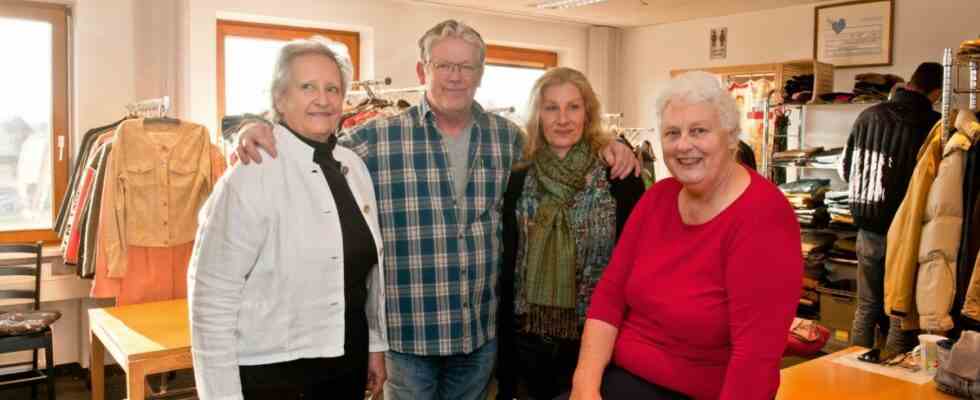Charlotte Gummert-Schulze points to a large table in the storeroom of the Glonner clothing store: “Every week, ten times as much arrives.” Donated clothing piles up on the table. Gummert-Schulze is a pensioner, like the majority of the five-strong, purely voluntary team, and three years ago she went from being a customer to a helper. The sales room has now been housed in the former Raiffeisenbank in Kulbing for almost four years. All around only fields and meadows – but fortunately enough parking spaces. “We would like to go back to Glonn,” says Annegret Biehn. Together with her husband Günther, who has since passed away, she built the clothing store almost seven years ago.
First they were three years in Glonner Marienheim. “We did everything ourselves. My husband Günther laid the carpet and set up the shelves, that was a lot of work.” But then, the sudden end: The clothing store had to leave the Marienheim because fire protection regulations could not be complied with. Fortunately, the team came across the empty bank branch through friends. Now, seven years later, the business is booming.
More than 10,000 hours of work have gone into the project
When you enter the store, you immediately notice the warm and relaxed atmosphere. The store is full of customers. Everywhere people browse through the shelves, here and there people talk – there is a colorful hustle and bustle. Sometimes more than 20 customers are in the store at the same time, says Gummert-Schulze. “Then you don’t really get anywhere. You can see how many clothes always arrive here. If you still have to do customer service, you simply put everything here in the storage room and that’s it.”
This is where the closet is located. But at the end of the year it’s over.
(Photo: Christian Endt)
The sorting and recycling of clothing takes place outside of opening hours. The clothing store opens its doors every Thursday from 2 p.m. to 5 p.m. – but people work much longer. The team has put in more than 10,000 hours of work over the past seven years. Well over 25,000 euros have already been raised. If you know the prices of the goods, this amount is even more remarkable: “These jeans here, one euro. A T-shirt, two euros. A dirndl, ten euros,” explain the pensioners – or “time millionaires”, as Gummert Schulze puts it describes. “And all goods are impeccable. No tears, no broken buttons, nothing.”
“We don’t throw anything away either,” says Gummert-Schulze. “What we can’t sell, we give somewhere else.” For a long time, they had regularly supported deliveries to Romania and Bulgaria with clothing via an acquaintance. Recently, 35 sacks and 35 boxes of clothing were ready for transport to earthquake victims in Turkey. “If we get dirty sheets, we give them to the animal shelter,” says Gummert-Schulze. One hundred percent of the money generated will be donated after deduction of rent and additional costs.
“About 60 percent of the proceeds go to the Glonner Tisch – we still feel very connected to them,” says Annegret Biehn. But one also donates, for example, to the women’s shelter, to the Rosenheim children’s hospice or similar institutions. “It’s hard to imagine life without us”, everyone here is of the same opinion.
The sales room of the Glonn clothing store: with a lot of heart, but little space.
(Photo: Christian Endt)
There are many donors and customers: “80 percent of our customers are regular customers,” says Gummert Schulze. “Of course, to a large extent socially disadvantaged people – but not only.” One is a social meeting place and wants to bring people together, so the common tenor. “I always like coming here. I’ve found a lot of great things here,” says a customer who is browsing through the shelves.
“It’s not just about helping socially disadvantaged people. We want to set an example,” says Angelika Bachmann. In the Atacama Desert, for example, 46,000 tons of clothing are thrown into the environment every year, which is incomprehensible to the members of the clothing association. “It’s just sick,” says Bachmann, a staunch customer of the store and now also responsible for press work. She organizes the website of the non-profit organization and establishes contacts with the media.
A new salesroom is needed by the end of the year. Otherwise it’s over
She then also clarifies the current problem: “If we don’t find anything by the end of the year, it will be the end of this project.” Until then, the current lease is still running – there will be no extension. “We are urgently looking for a social entrepreneur or someone else who has space available for us and who is not just interested in making money.”
You don’t want to end up like the store with a heart. A Siegertsbrunner project that provides free clothing for Ukrainian refugees and now has to close due to a lack of space.
“140 square meters would be nice – more, of course, even better,” says Angelika Bachmann. “Preferably directly in Glonn, so that we are easy to reach on foot or by bike.” Charlotte Gummert-Schulze emphasizes: “We are a project by Glonner, for Glonner. That’s where we came from, and that’s where we want to go again.” And they firmly believe that they will find something. Together they express their unconditional wish once again: “We are doing this out of conviction and we will continue to do it, but we need help now.”

